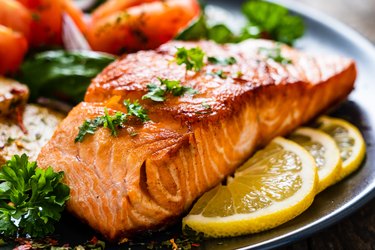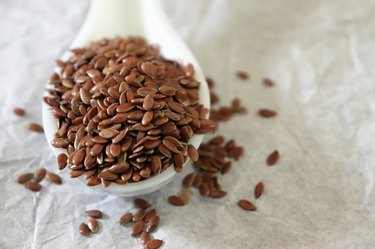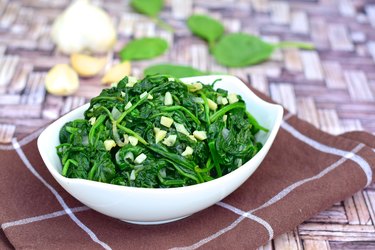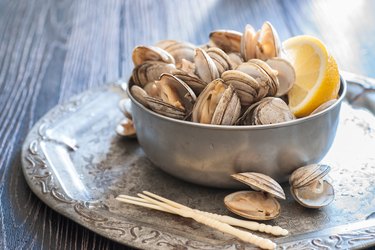
While there's no single thing that'll keep your mind sharp, certain factors — such as diet — can make a big splash when it comes to building better brainpower.
Specifically, eating the right type of nutrients may help protect cognitive function well into your golden years (at the same time, not getting enough nutrients can hinder brain health).
Video of the Day
Video of the Day
Here, registered dietitian Amanda Holtzer, RD, shares which brain nutrients you should prioritize to make the most of your mental capacity.
1. Vitamin D
While vitamin D is widely known for its role in maintaining strong bones (because it's essential to calcium absorption) the fat-soluble vitamin is crucial for neurological health as well.
That's because vitamin D helps preserve the structure and integrity of neurons, Holtzer says. In doing so, "it protects us against neuroinflammation, which is what typically precedes cognitive decline and neurodegeneration," she explains.
What's more, "calcitriol, a form of vitamin D3, has been shown to increase levels of antioxidants such as glutathione, which protects nerve conduction pathways in the brain," Holtzer says.
Essentially, vitamin D safeguards the brain against the effects of aging — and it bolsters your mental health. In fact, vitamin D deficiency is linked to mood changes and depression, per the Cleveland Clinic.
How to Get Vitamin D
For adults, the recommended intake of vitamin D is 20 micrograms, according to the U.S. Food and Drug Administration (FDA).
Vitamin D is present in certain foods including tuna, salmon, mackerel, beef liver and egg yolks, but most of us don't eat enough of these foods to get an adequate amount, Holtzer says.
"Your body can also produce vitamin D with sun exposure," she says. Here's how: When your skin is exposed to sunlight, special receptor cells convert UVB rays to vitamin D.
"If you're unable to spend at least 15 minutes outdoors each day, a vitamin D supplement may be the way to go," Holtzer says. "While most adults can benefit from 600 to 2000 IU per day, it's important to discuss proper dosage with your doctor."
2. Omega-3s
"Omega-3 fatty acids have been commonly dubbed as 'brain food,' and for good reason," Holtzer says.
Several kinds of omega-3 fatty acids — including eicosapentaenoic acid (EPA), docosahexaenoic acid (DHA) and docosapentaenoic acid (DPA) — show neuroprotective effects in aging and neurodegenerative disorders, Holtzer says.
"EPA is a key player in protection against inflammation of brain cells" and research has shown it may be correlated with beneficial effects on mood disorders, she says.
DHA — quantitatively the most important omega-3 in the brain — is massively abundant in the structure of the brain's cell membranes and plays a role in both cell structure and cell function, Holtzer adds.
Some studies even show that eating more foods with omega-3s is linked to a lower risk of developing Alzheimer's disease, dementia and other cognitive-related problems, according to the National Institutes of Health (NIH). Still, more research is needed to better understand the effects of omega-3s on brain health.
How to Get Omega-3s
"EPA and DHA decrease naturally as we age, so as we grow older, it's especially important to ensure we are consuming adequate amounts of omega-3s," Holtzer says.
There are plenty of omega-3 rich foods at your reach, such as salmon, tofu, walnuts and kidney beans.
3. Magnesium
"Although it's the fourth most abundant mineral in the body, magnesium really doesn't get the amount of airtime it deserves," Holtzer says.
Magnesium is very important for brain health and function. Research has shown that this mighty mineral is particularly vital for nerve transmission and protects against neuronal cell death, Holtzer says.
Plus, there's strong evidence to suggest that magnesium plays a role in the prevention of migraines, depression and anxiety, Holtzer adds. That's in part because magnesium is involved in the psychoneuroendocrine system, aka the system that deals with feelings of stress and anxiety, she explains.
In fact, studies have found that low levels of serum magnesium are associated with an increased prevalence of stress and depression whereas a higher intake of dietary magnesium is related to lower anxiety scores, Holtzer says.
How to Get Magnesium
"About 50 percent of the United States population isn't getting enough magnesium," Holtzer says. Adults need between 310 to 420 milligrams of magnesium per day, depending on sex assigned at birth, according to the NIH.
To get more of this mineral, pile your plate with magnesium-rich foods like spinach, beans and brown rice, or take a daily supplement.
4. Vitamin C
Most of us know vitamin C for its immune-supporting power, but that's not its only asset. Vitamin C has antioxidant properties that protect the brain as well, Holtzer says.
In the brain, vitamin C shields against excitotoxicity, or cell death, Holtzer explains. This may help explain why a vitamin C deficiency can contribute to cognitive impairment, confusion and difficulty concentrating.
"Vitamin C is also needed for the conversion of dopamine to serotonin (commonly called the happiness hormone)," Holtzer says. Matter of fact, vitamin C deficiency is linked to symptoms of depressions, she adds.
How to Get Vitamin C
"The good news is that it's very easy to get adequate vitamin C through the diet," Holtzer says. Adults assigned female at birth need 75 milligrams of vitamin C per day while adults assigned male at birth need 90 milligrams per day, per the NIH.
Here are some foods that provide almost an entire day's worth of vitamin C, per Holtzer:
- Kiwi
- Bell peppers
- Citrus fruits
- Broccoli
- Brussels sprouts
- Berries
5. Vitamin B12
Not only is B12 required for proper brain development and function, but this essential vitamin is also vital in the prevention of certain central nervous system conditions, mood disorders and dementia, Holtzer says.
That's why it's important to start taking in enough of it earlier in life. For instance, getting enough B12 is especially important in expecting mothers. "Research indicates that B12 supplementation during pregnancy can reduce the risk for fetal neurodevelopmental disorders," Holtzer says.
Similarly, some evidence also shows that a higher intake of vitamin B12 intake is associated with improved cognitive functioning, school performance and developmental indexes among children, Holtzer says.
How to Get B12
Adults need 2.4 micrograms of B12 per day while pregnant and breastfeeding people should aim for 2.6 micrograms and 2.8 micrograms per day respectively, per the NIH.
Vitamin B12 is found naturally in a large variety of animal products (like fish, meat, poultry, eggs, milk and other types of dairy) as well as fortified plant-based foods (like fortified cereals, tofu and soy milk).
If you're still not making the cut, you can also consider taking a daily B12 supplement.
- Cleveland Clinic: “Vitamin D Deficiency”
- National Institutes of Health: “Omega-3 Fatty Acids”
- National Institutes of Health: “Magnesium”
- National Institutes of Health: “Vitamin C”
- U.S. Food and Drug Administration: “Daily Value on the New Nutrition and Supplement Facts Labels”
- National Institutes of Health: “Vitamin B12”
Was this article helpful?
150 Characters Max
0/150
Thank you for sharing!
Thank you for your feedback!




